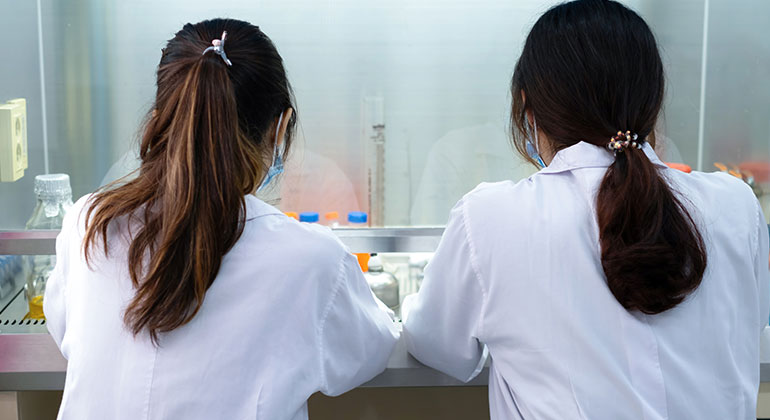Women Whose Sister Experienced Postpartum Psychosis Are More Than 10 Times as Likely to Experience It Themselves, According to New Research
Study provides robust evidence of increased risk in full siblings, suggesting both genetic and shared environmental influences

Mount Sinai researchers have found for the first time that a woman is more than 10 times more likely to develop postpartum psychosis if her sister had experienced the condition, compared to a woman with a sister who did not. The findings, which were published May 19 in the American Journal of Psychiatry and highlighted at the American Psychiatric Association’s annual meeting press briefing the same day, suggest both genetic and shared environmental influences.
Postpartum psychosis is a rare but serious mental illness that leaves a devastating impact on mothers in the vulnerable weeks and months after childbirth. It carries increased risk of suicide and infanticide if left untreated. Among the early warning signs of postpartum psychosis are severe mood swings, hallucinations, disorganized thinking, insomnia, paranoia, and thoughts of self-harm. Despite the devastating ramifications of the disorder, it remains vastly understudied and a challenge for physicians to diagnose and address.
“Every woman of childbearing age and their physicians need to know about the existence of, severity, symptoms, and familial risk for postpartum psychosis so it can be promptly diagnosed and, hopefully, prevented,” said Veerle Bergink, MD, PhD, Director of the Women’s Mental Health Center at Mount Sinai and co-senior author of the paper. “At present, too many women at higher risk don’t know it and are left on their own with a new baby and no support. We hope these study findings will help move the needle and impart change. With wider recognition of this particular condition and risk factors for it, we can implement changes to help ease the burden for women during this postpartum period.”
The Mount Sinai study team examined the records of more than 1.6 million women from the Swedish nationwide registries, identifying 2,514 women who had experienced postpartum psychosis within three months of their first childbirth. In addition to finding that a woman is more than 10 times more likely to develop postpartum psychosis if her sister had the condition, the Swedish registry study showed that the presence of bipolar disorder in a sister doubles the woman’s risk of developing postpartum psychosis. Women with a sister who has bipolar disorder and postpartum psychosis were shown to be at highest risk; their risk for developing postpartum psychosis themselves is 14 times increased.
The study measured relative recurrent risk for the disorder, which implies increased likelihood of its appearance in another member of the family. This differs from actual risk, which refers to the probability of developing the condition. Researchers learned that while the relative risk of postpartum psychosis is quite high in full siblings, the absolute risk for women with an affected sister is still low at 1.6 percent.
“These findings support the view that even though there is overlap between postpartum psychosis and bipolar disorder, these are in fact, distinct conditions,” said Dr. Bergink. “We hope this new data will help move the needle and impart change. With wider recognition of this particular condition and risk factors for it, measures can and should be taken to help ease the burden for women during this postpartum period.”
Beyond expanding awareness around postpartum psychosis, this study provides a solid foundation for the next step of research, aimed at early recognition and prevention. Work that involves identifying the genes responsible for this disease is already underway at Mount Sinai in the lab of Behrang Mahjani, PhD, Assistant Professor of Psychiatry at the Icahn School of Medicine at Mount Sinai and co-author of the study.
“We’re using complex molecular data to investigate the genetic architecture of the disease,” says Dr. Mahjani. “Knowing what specific genes are involved will help us dive into the mechanisms and triggers of postpartum psychosis, and if they’re hormone- or immune-related. And that, in turn, could lead us to novel treatments and ways to proactively inform women of their risk before they’re faced with a severe health crisis.”
About the Mount Sinai Health System
Mount Sinai Health System is one of the largest academic medical systems in the New York metro area, with 48,000 employees working across seven hospitals, more than 400 outpatient practices, more than 600 research and clinical labs, a school of nursing, and a leading school of medicine and graduate education. Mount Sinai advances health for all people, everywhere, by taking on the most complex health care challenges of our time—discovering and applying new scientific learning and knowledge; developing safer, more effective treatments; educating the next generation of medical leaders and innovators; and supporting local communities by delivering high-quality care to all who need it.
Through the integration of its hospitals, labs, and schools, Mount Sinai offers comprehensive health care solutions from birth through geriatrics, leveraging innovative approaches such as artificial intelligence and informatics while keeping patients’ medical and emotional needs at the center of all treatment. The Health System includes approximately 9,000 primary and specialty care physicians and 10 free-standing joint-venture centers throughout the five boroughs of New York City, Westchester, Long Island, and Florida. Hospitals within the System are consistently ranked by Newsweek’s® “The World’s Best Smart Hospitals, Best in State Hospitals, World Best Hospitals and Best Specialty Hospitals” and by U.S. News & World Report's® “Best Hospitals” and “Best Children’s Hospitals.” The Mount Sinai Hospital is on the U.S. News & World Report® “Best Hospitals” Honor Roll for 2025-2026.
For more information, visit https://www.mountsinai.org or find Mount Sinai on Facebook, Instagram, LinkedIn, X, and YouTube.